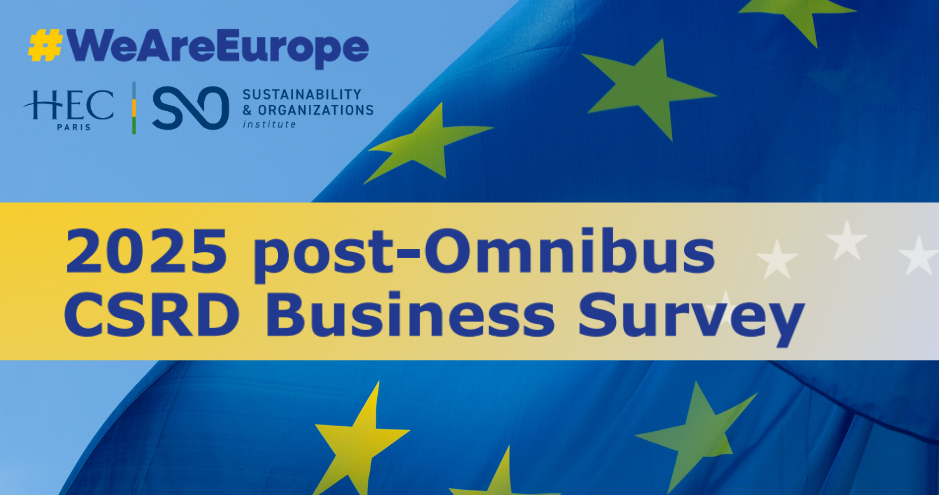Les entreprises européennes soutiennent massivement la directive CSRD selon une dernière étude
Une enquête réalisée par le collectif #WeAreEurope, en partenariat avec HEC Paris révèle que 61% des entreprises européennes sont favorables à la CSRD actuelle, tandis que 51% rejettent le projet de réforme Omnibus, contredisant ainsi le discours dominant sur l'impact de cette réglementation.

Télécharger les résultats de l'enquête
Une étude paneuropéenne d'ampleur inédite
L'enquête, conduite entre le 31 mars et le 30 avril 2025, a recueilli plus de 1 000 réponses d'entreprises issues de 26 pays européens, représentant divers secteurs, tailles et niveaux de maturité ESG. Co-dirigée notamment par le Professeur François Gemenne, Directeur Académique du master en Développement Durable et Innovation Sociale d'HEC Paris et Brian Hill, Directeur Académique du Centre Inclusive Economie (S&O) d’HEC Paris, cette étude constitue la première consultation d'envergure des entreprises directement concernées par la directive sur le reporting de durabilité (CSRD). Avec 40% de répondants occupant des postes de direction (C-level), l'étude souligne l'importance stratégique accordée à ces questions de durabilité.
La CSRD perçue comme un atout stratégique, pas comme un fardeau
Contrairement aux déclarations de certains grands lobbies économiques et décideurs politiques, les résultats démontrent que les entreprises européennes ne perçoivent pas la CSRD comme une menace pour leur compétitivité. Au contraire, 88% des répondants estiment que cette directive incarne la vision économique, sociale et environnementale européenne, et 62% la considèrent comme un atout stratégique pour la souveraineté de l'UE.
En France, le soutien est particulièrement marqué avec 64% d'entreprises satisfaites. Plus surprenant encore, même parmi les fonctions financières traditionnellement plus réservées, seuls 27% des professionnels se déclarent défavorables à la directive.
Des entreprises en demande d'ajustements ciblés, non d'un recul réglementaire
L'étude révèle que les entreprises ne souhaitent pas l'abandon de la CSRD, mais plutôt des améliorations techniques : 86% appellent à l'automatisation des indicateurs de reporting, 75% à la création d'un "guichet unique ESG" pour centraliser les obligations, et 69% demandent une meilleure articulation avec les autres référentiels (SFDR, Taxonomie). De plus, seulement 25% soutiennent la proposition d'élever le seuil d'application à 1 000 salariés contenue dans le projet Omnibus de la Commission européenne. "Il est temps de prendre le pouls du monde des affaires en Europe face aux grands changements réglementaires en cours d'examen, afin d'optimiser les chances que ces nouvelles politiques soient réellement efficaces et qu'elles parviennent à concilier durabilité et compétitivité des entreprises européennes, de manière à ce que l'une renforce l'autre," souligne François Gemenne.
Contributeurs académiques :
Delphine Gibassier, PhD HEC, Vert de Gris
Brian Hill, CNRS, Department of Economics and Decision Sciences and S&O Institute, HEC Paris
Charles H Cho, Professor of Sustainability Accounting and Erivan K. Haub Chair in Business & Sustainability, Member of the GRI’s Global Sustainability Standards Board (GSSB)
Marieke Huysentrut, Strategy Department and S&O Institute, HEC Paris
Victor Wagner, LMU Munich
Andreas Rasche, Copenhagen Business School
François Gemenne, HEC Paris Department of Economics and Decision Sciences and Academic Director of HEC Paris Master in Sustainability and Social Innovation
Alexandre Rambaud, AgroParisTech-CIRED, Codirector Chaire “Double matérialité”, Scientific director of CERCES (Cercle des comptables environnementaux et sociaux)
Maxime Mathon, Codirector Chaire “Double matérialité”
Véronique Blum, HDR, Université Grenoble Alpes, Chaire Secteur financier
Clément Morlat, CERCES
Lire le communiqué de presse